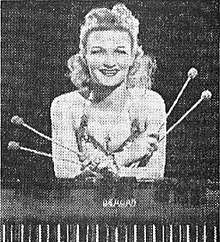Gloria Parker
Gloria Parker is an American musician and bandleader who had a radio show during the big band era. The Gloria Parker Show was broadcast nightly from 1950 to 1957, coast to coast on WABC. Parker entertained her audience by playing the marimba, organ, and the singing glasses (glass harp). Dubbed Princess of the Marimba, she conducted the 21-piece Swingphony from the Kelly Lyceum Ballroom in Buffalo, New York. This was the largest big band led by a female bandleader. Edgar Battle and Walter Thomas were arrangers for the Swingphony.
Gloria Parker | |
|---|---|
 Gloria Parker in a 1944 advertisement | |
| Background information | |
| Born | Brooklyn, New York, U.S. |
| Genres | Jazz |
| Occupation(s) |
|
| Instruments |
|
| Years active | 1940s–present |
| Associated acts | Swingphony |
| Website | www |
Parker is also known for her starring roles in music films (Soundies), such as Broadway and Main with Stepin Fetchit, Four Letters, Here Comes the Fattest Man in Town with comedic personality Mel Blanc as Santa Claus, Penthouse Party featuring Parker playing the glass harp, and Wise Men Say, all produced and directed by William Forest Crouch. She composed the music and wrote the lyrics for the films. Soundies were viewed on a Panoram, a coin-operated film jukebox in bars, nightclubs, restaurants, amusement parks, and community centers.
Biography
Early life
The grand-daughter of a Czech emigrant[1]and daughter of musician Rita Rose, Parker was born in Brooklyn, New York, and studied violin[2] with Leopold Auer and performed on CBS Your Hit Parade with bandleader Mark Warnow and Raymond Scott. During the Second World War, Parker's father was a United States Air Force test pilot stationed in Hawaii.
Career
Parker worked as a songwriter, bandleader and musician. She performed with her orchestras playing the marimba, glass harp or musical glasses, piano, organ, violin, viola, vibraphone, xylophone, guitar, drums and all Latin percussion instruments.
Her radio program, The Gloria Parker Show, featured her all-female Swingphony, the largest big band led by a woman. In the early 1950s, she hosted a radio program with Vincent Lopez from the Taft Hotel in Manhattan called Shake the Maracas.[2] She hosted an evening broadcast on WOR from the New York City Hotel Edison. Parker would open the show with the glass harp or musical glasses and feature the popular latin sound on her marimba with her orchestra.
The Big Band Era suffered from a musicians' recording ban from August 1942 to November 1944. The union that a majority of musicians belonged to did not allow its members to record until the record companies such as CBS agreed to pay them each time their music was played on the radio. This happened after an earlier ban of ASCAP songs from radio stations which led to the demise of this style of swing music. Parker emerged as a spokesperson for musicians and earned the title "Famous One Share Stockholder" in her battle for musician rights with CBS, RCA, and Time Inc. The national media would anxiously await Parker's head to head confrontations with CBS founder William S. Paley and RCA chairman of the board David Sarnoff at the annual stockholder meetings.
Personal life
As of 2012, Parker resides on Long Island, New York.[3] She designs and makes her own wardrobe, a talent she has utilized throughout her career with show stopping gowns, suits, dresses and coats.
Swing era music
- "In Santiago by the Sea" by Gloria Parker and recorded by Vincent Lopez and his Orchestra.
- "Tonight Be Tender to Me" by Gloria Parker and recorded by Una Mae Carlisle.
- "Daddy from Georgia Way" recorded by Bob Chester and his Orchestra on Columbia Records, lyrics and music by Daisy Lawton, a pen name for Gloria Parker.
- "Marimba Merengue" by Gloria Parker
- "Stars and Stripes Forever Merengue" by Gloria Parker
- "The Best Idea You Had" by Gloria Parker and recorded by Una Mae Carlisle with Bob Chester and his Orchestra
- "The Up and Down Mambo" by Gloria Parker
- "The Sweetest Words I Know" by Gloria Parker on Columbia Records with Vincent Lopez Orchestra
- "Shake the Maracas" lyrics and music by Gloria Parker, and name of a radio program on WABC hosted by Gloria Parker and Vincent Lopez
- "The Dixieland Rhumba" lyrics and music by Gale Porter, a pen name for Gloria Parker.
Special appearances
- Saturday Night Live, Christmas Special, played the glass harp
Filmography
- Broadway Danny Rose (1984)
References
- Behrens, John (March 2011). America's Music Makers: Big Bands & Ballrooms 1912-2011. AuthorHouse. pp. 36–. ISBN 978-1-4567-2952-3. Retrieved September 1, 2017.
- McShane, Larry (June 11, 2012). "Long Island glasspiel virtuoso Gloria Parker still has the magic touch". New York Daily News. New York. Retrieved July 3, 2016.
- Radio Music Live 1920–1950, A Pictorial Gamut by Morris N. Young and John C. Stoltzfus, Published by Arrangement with Life Music, Inc., pp. 47, 50, 237, 239, 240, 241
- Singing Glasses is also the name of a 1980 record album composed by Gloria Parker playing the glass harp.
- Life, May 1959, "Rising to a Point of Disorder", Famous One Share Stockholder Gloria Parker confronting Radio Corporation of America (RCA) with Billings-Gate at the annual stock holder meeting.
External links
- Official site
- bizbash Water Glasses